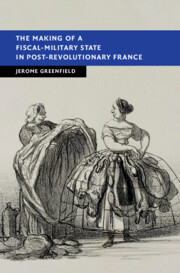Book contents
- The Making of a Fiscal-Military State in Post-Revolutionary France
- New Studies in European History
- The Making of a Fiscal-Military State in Post-Revolutionary France
- Copyright page
- Contents
- Figures and Tables
- Acknowledgements
- Abbreviations
- Chapter 1 The Nineteenth-Century French State and Its Rivals
- Chapter 2 The Revolutionary Quest for Fiscal Stability, 1789–1799
- Chapter 3 Developing a Post-Revolutionary Fiscal Politics, 1799–1814
- Chapter 4 Recasting the Fiscal-Military System, 1814–1821
- Chapter 5 The Resurgence of French Power, 1821–1830
- Chapter 6 The 1830 Revolution and the Limits of Fiscal Reform
- Chapter 7 The Ascent of the Interventionist Orleanist State, 1830–1848
- Chapter 8 The Rise and Fall of Austerity, 1848–1856
- Chapter 9 Reaching the Limits of the Fiscal-Military System, 1856–1871
- Chapter 10 The Triumph of the Notables
- References
- Index
Chapter 6 - The 1830 Revolution and the Limits of Fiscal Reform
Published online by Cambridge University Press: 25 August 2022
- The Making of a Fiscal-Military State in Post-Revolutionary France
- New Studies in European History
- The Making of a Fiscal-Military State in Post-Revolutionary France
- Copyright page
- Contents
- Figures and Tables
- Acknowledgements
- Abbreviations
- Chapter 1 The Nineteenth-Century French State and Its Rivals
- Chapter 2 The Revolutionary Quest for Fiscal Stability, 1789–1799
- Chapter 3 Developing a Post-Revolutionary Fiscal Politics, 1799–1814
- Chapter 4 Recasting the Fiscal-Military System, 1814–1821
- Chapter 5 The Resurgence of French Power, 1821–1830
- Chapter 6 The 1830 Revolution and the Limits of Fiscal Reform
- Chapter 7 The Ascent of the Interventionist Orleanist State, 1830–1848
- Chapter 8 The Rise and Fall of Austerity, 1848–1856
- Chapter 9 Reaching the Limits of the Fiscal-Military System, 1856–1871
- Chapter 10 The Triumph of the Notables
- References
- Index
Summary
The limits of the Bourbons’ attempt to assert their legitimacy became apparent in the late 1820s, particularly as the economy slumped after 1825. The downturn fuelled the rise of economic liberalism, invoked by a vocal group of the government’s opponents in their quest for a smaller state and cheaper government – ‘un gouvernement à bon marché’. Though many of these people found themselves in power after the overthrow of the Bourbons in 1830, the new July Monarchy did little to reduce the size of the state. Rather, it largely upheld the existing fiscal system, doing little to reduce taxes and resorting to public credit to cover shortfalls in public finance that arose in the immediate aftermath of the Revolution of 1830. Borrowing therefore facilitated the survival of the fiscal system, which only incurred minor changes to direct taxes, alcohol duties and customs. While the Revolution changed little and thus demonstrated the continuities that affected French politics and economics during the ‘Age of Revolution’, it produced new pressures to reform the fiscal system, many of which encouraged the development of the French state’s economic interventionism from the late 1830s onwards.
Keywords
- Type
- Chapter
- Information
- Publisher: Cambridge University PressPrint publication year: 2022

